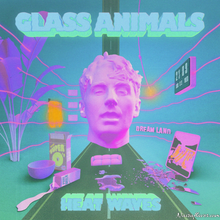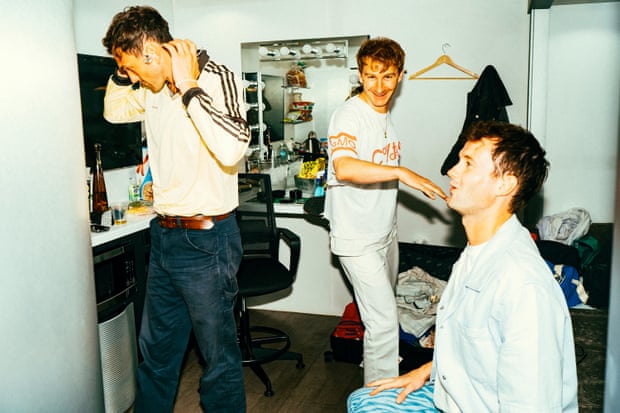
“Full Lyrics Heat Waves”
Don’t stop, baby, you can walk through
Don’t want, baby, think about you
You know that I’m never gonna loseRoad shimmer wigglin’ the vision
Heat, heat waves, I’m swimmin’ in a mirror
Road shimmer wigglin’ the vision
Heat, heat waves, I’m swimmin’ in a—
Sometimes, all I think about is you
Late nights in the middle of June
Heat waves been fakin’ me out
Can’t make you happier now
Sometimes, all I think about is you
Late nights in the middle of June
Heat waves been fakin’ me out
Can’t make you happier now
Usually I put somethin’ on TV
So we never think about you and me
But today I see our reflections clearly
In Hollywood, layin’ on the screen
You just need a better life than this
You need somethin’ I can never give
Fake water all across the road
It’s gone now, the night has come, but
Sometimes all I think about is you
Late nights in the middle of June
Heat waves been fakin’ me out
Can’t make you happier now
You can’t fight it, you can’t breathe
You say somethin’ so lovin’, but
Now I gotta let you go
You’ll be better off in someone new
I don’t wanna be alone
You know it hurts me too
You look so broken when you cry
One more and then I’ll say goodbye
Sometimes, all I think about is you
Late nights in the middle of June
Heat waves been fakin’ me out
Can’t make you happier now
Sometimes, all I think about is you
Late nights in the middle of June
Heat waves been fakin’ me out
Can’t make you happier now
I just wonder what you’re dreamin’ of
When you sleep and smile so comfortable
I just wish that I could give you that
That look that’s perfectly un-sad
Sometimes, all I think about is you
Late nights in the middle of June
Heat waves been fakin’ me out
Heat waves been fakin’ me out
Sometimes, all I think about is you
Late nights in the middle of June
Heat waves been fakin’ me out
Can’t make you happier now
Sometimes, all I think about is you
Late nights in the middle of June
Heat waves been fakin’ me out
Can’t make you happier now
Road shimmer wigglin’ the vision
Heat, heat waves, I’m swimmin’ in a mirror
Road shimmer wigglin’ the vision
Heat, heat waves, I’m swimmin’ in a mirror
The Oxford quartet’s song Heat Waves is the most played globally on Spotify this week, and a curveball amid pop’s solo artists. Frontman Dave Bayley explains how it happened
With solo artists currently dominating the charts and the zeitgeist, now is not the ideal time to be in a band – unless it’s Glass Animals. This week, the Oxford quartet became the first British group to top Spotify’s global songs chart with their synthpop single Heat Waves, racking up 4.26m plays per day on the streaming platform. It was a feat their fans saw coming: last year, Heat Waves was the fourth most-streamed song in the US and the most-streamed in Australia, having been played more than 1bn times worldwide.
This is a remarkable achievement for an act with no previous big hits – but that’s not the only strange thing about their success. A sultry, wistful number with an extremely catchy chorus, Heat Waves has had an unusually slow rise to prominence: it was released in June 2020 and for months it failed to break into the UK Top 40 or US Billboard Hot 100. Its subsequent ascent up the charts – peaking at No 5 in the UK, No 1 in Australia and No 3 in the US, where it currently stands – was unprecedented in its leisurely nature; it now holds the record for the longest climb to the Top 5 in the US chart’s history.
Although the band weren’t exactly languishing in obscurity – 2014 single Gooey eventually went platinum in the US despite never actually breaking into the charts, while their 2016 album How to Be a Human Being was nominated for the Mercury prize – even a year ago, it would have been difficult to imagine Glass Animals achieving the popularity they have today.
Frontman and songwriter Dave Bayley wrote Heat Waves alone in the spring of 2019 in a recording studio complex in London. Or at least he thought he was by himself – towards the end of his session he turned round to discover Johnny Depp was watching him. The actor, unfortunately, did not spot Heat Waves’ potential. “He literally didn’t react in any way to the song,” recalls Bayley. “He almost spoke to me afterwards as if there had been a fart in the room – something weird and slightly negligible. There was no compliment.”
Initially, Bayley wasn’t even sure he wanted to perform the song himself, and attempted to pitch it to another artist. Despite the track’s enormous success, he still thinks it may have worked better in somebody else’s voice. That’s because the subject of the song is so personal he can barely perform it without crying: the bittersweet, nostalgic nature of the chord progression made him think of his best friend who died. Afterwards, he decided to make the lyrics more vague, so it could also apply “to a relationship situation” and appeal to a wider audience. “Songs that are insanely specific, I don’t relate to as much,” he says.
Bayley was downbeat about its prospects in the run-up to the track’s release. The band had only just survived a very stressful period: the previous year, drummer Joe Seaward had sustained a serious head injury when he was hit by a lorry while cycling, and for a while it was unclear whether he would walk or talk again. Soon after his recovery – and just as the band were preparing to release their third album, Dreamland – the pandemic hit, plunging them straight back into the doldrums. “I was so worried,” says Bayley. “It immediately felt like there was no space in the world for new music. Everyone was listening to old music, finding comfort in the past. I was floored, for two weeks I just sat in my pants. My managers were like: you just have to put the record out and it’s going to be a dud. Start writing the next one.”

In fact, Glass Animals did the opposite. There is no single secret to Heat Waves’ sleeper-hit success – instead there were many minor individual efforts to drum up interest in the song. Bayley himself was behind some of the more off-the-cuff approaches, including an impromptu gig on a Hackney street corner that was cut short when the police “sweetly” notified them that they were standing next to a sign that read “no music”. More successful tactics included releasing the individual audio files from the album online so fans could remix the tracks. Helen Fleming, the band’s marketing manager at their label Polydor, says engaging audiences in such ways is now hugely important: “Fan-created content is becoming more and more fundamental in how music travels so we knew we’d want to lean into that.”
A TikTok trend has also helped Heat Waves gain popularity in recent months, with users soundtracking videos about absent loved ones with the song. Bayley describes the trend as “quite sad and sentimental which really fits the song – I’ve seen some other TikTok trends where it’s just someone putting mustard on a watermelon and jumping over milk crates.” But by the time TikTok entered the frame, the song had been building an audience for more than a year thanks to its inclusion on the Fifa 21 soundtrack, its popularity on the video game Minecraft, and TV and radio promotion, says Fleming, meaning it “was primed to explode in the way that it has”.
Modern methods aside, both Bayley and Fleming attribute a chunk of Heat Waves’ global popularity to the years Glass Animals spent touring the US, giving them a good foundation in a country where you actually need to be physically present, explains Fleming. Australian acclaim was also crucial. Heat Waves was voted the No 1 song of 2020 in the Triple J Hottest 100, the taste-making radio station’s annual music poll. Bayley thought it was so unlikely that the band would top the chart that he promised to get his first tattoo – an outline of Australia on his bum – if Glass Animals triumphed. He removed the bandages last week.

Fleming says her team were also caught off-guard. “At the beginning of the campaign we weren’t talking about the singles chart,” says Fleming. “It’s unusual for a band to break a single in the way Glass Animals have.”
It is especially rare for an act with a traditional band set up to have a huge hit single nowadays. Over the past decade, the popularity of such groups has dived, in part due to the dominant cultural forces of pop, electronic music and rap, explains Hannah Ewens, Rolling Stone UK’s features editor. Paradoxically, however, this also may be why Glass Animals have thrived. “Their music doesn’t really sound like guitar music or ‘band’ music,” says Ewens. “It’s fairly close to being what’s been called Spotify-core: quite electronic, catchy, mid-tempo, muted, pensive but neutral in mood. The sort of inoffensive sound that could live on lots of playlists.”
Thanks to that broad appeal, Glass Animals’ rise looks set to be exponential. The band are currently awaiting next month’s Brit awards – where they are up for song of the year and best rock act – and the Grammys, where they have scored their first nomination, for best new artist. In the meantime, Bayley is taking some time off from Glass Animals, but not music-making. He is currently working with Jae5, best known for producing rapper J Hus’s work, as well as a female artist he cannot name, but who he describes as “one of my favourite songwriters of our generation”. Collaborating, he thinks, is “the best way to learn: to see how other people work, and steal their tricks.” After Heat Waves’ success, he may need to closely guard his own.
… we have a small favour to ask. Millions are turning to the Guardian for open, independent, quality news every day, and readers in 180 countries around the world now support us financially.
We believe everyone deserves access to information that’s grounded in science and truth, and analysis rooted in authority and integrity. That’s why we made a different choice: to keep our reporting open for all readers, regardless of where they live or what they can afford to pay. This means more people can be better informed, united, and inspired to take meaningful action.
In these perilous times, a truth-seeking global news organisation like the Guardian is essential. We have no shareholders or billionaire owner, meaning our journalism is free from commercial and political influence – this makes us different. When it’s never been more important, our independence allows us to fearlessly investigate, challenge and expose those in power.
